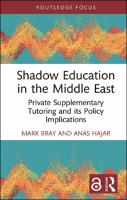Shadow Education in the Middle East
Proposal review
Private Supplementary Tutoring and its Policy Implications
Abstract
This volume offers insights into the role of private supplementary tutoring in the Middle East, and its far-reaching implications for social structures and mainstream education. Around the world, increasing numbers of children receive private tutoring to supplement their schooling. In much of the academic literature this is called shadow education because the content of tutoring commonly mimics that of schooling: as the curriculum changes in the schools, so it changes in the shadow. While much research and policy attention has focused on private tutoring in East Asia and some other world regions, less attention has been given to the topic in the Middle East. Drawing on both Arabic-language and English-language literature, this study commences with the global picture before comparing patterns within and among 12 Arabic-speaking countries of the Middle East. It presents the educational and cultural commonalities amongst these countries, examines the drivers of demand and supply of shadow education, and considers the dynamics of tutoring and how it impacts on education in schools. In addition to its pertinence within the Middle East itself, the book will be of considerable interest to academics and education policy makers broadly concerned with changing roles of the state and private sectors in education. The Open Access version of this book, available at www.taylorfrancis.com, has been made available under a Creative Commons Attribution-Non Commercial-No Derivatives 4.0 license.


 Download
Download